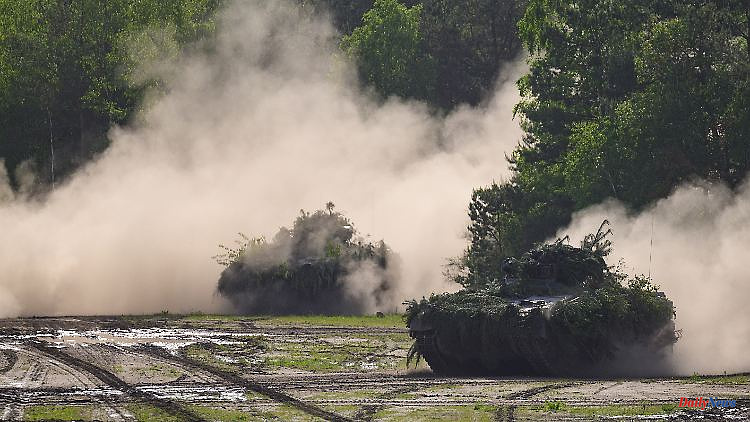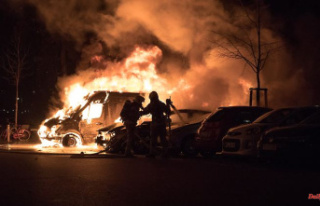Ten months after the start of Putin's major invasion of Ukraine, Germany is sending infantry fighting vehicles. Why did Chancellor Olaf Scholz find it so difficult to take this step and why do Kiev's troops have to continue to wait for "Leopard 2"? Eastern Europe historian Franziska Davies from Munich's Ludwig Maximilian University on Russian war aims and German illusions.
ntv.de: Yesterday evening the federal government promised to supply the Ukraine with infantry fighting vehicles of the "Marder" type. Tanks will also come from France and the USA. Does this take Western aid to a new level?
Franziska Davies: Yes, Ukraine has been demanding western tanks for a long time, so this is a correct and important step by the three countries, but it is also a long overdue one. With regard to Germany's actions, a pattern can certainly be identified: the delivery of certain weapon systems is refused with little convincing justification and only goes along with it when others decide to make similar deliveries.
When asked to deliver weapons, the reply from the Chancellery was always: no German solo efforts. Is that one of the “unconvincing justifications” from your point of view?
That's not convincing at all. On the one hand, Scholz explicitly claims Germany's military leadership role in Europe, on the other hand, the allies have to serve as an excuse for Germany not to assume this leadership role. Just a few weeks after the total invasion, military experts like Claudia Major were already calling for "Leopard" tanks for Ukraine. Since this is a German tank, any delivery to Ukraine must be approved by the federal government. But instead of assuming the claimed leadership role here and coordinating and promoting the deliveries, the federal government is blocking and referring to the allies, who signaled months ago that they would not stand in the way of the delivery of the "Leopards". To date there have been no definitive commitments for the "Leopards" from Germany.
How important would these be to the Ukrainian troops?
In the course of the war, one saw how important, even decisive, Western arms supplies are for Ukraine. This was the only way that large parts of the areas occupied since 2022 could be recaptured. It is unclear to me why the federal government is acting in this way, but in view of some statements from the SPD, I suspect that significant parts of the parliamentary group do not actually want to support the announced "turning point" and need to be urged to make certain decisions. Ukraine is paying the price for this attitude.
Referring to the war in 2022, SPD parliamentary group leader Rolf Mützenich recently told the "taz": "I didn't suspect that people would still do this to each other." Do you share his point of view?
In view of the Russian war crimes, it is shameful to speak of "reciprocity" here. And it's an important political decision-maker who is doing that, which worries me a lot. The war situation is very clear: no Ukrainian soldier is terrorizing Russian civilians. No Russian city is reduced to rubble by Ukrainian bombs. Aggressor and victim are to be named very clearly here.
Where do you see the reasons that Mützenich does not do exactly that?
To be honest, I'm a bit puzzled as to why this is still happening almost a year after the total Russian invasion. Putin and his entourage openly formulate the intention of annihilation, in the areas occupied by Russia we are witnessing a genocidal occupation policy. Up until February 2022, many might not have imagined that in 21st century Europe, a state could still instigate a war on a neo-imperial, pseudo-historical mission to destroy a state that is seen as inferior, as a historical error. But why this is still happening is beyond me. Many apparently refuse to acknowledge reality, possibly because they would then have to abandon long-cherished notions of the panacea of "dialogue" or their romanticization of Russia, or because they find it difficult to own up to their misjudgments.
In your opinion, how widespread is the idea that this will to destroy, as you just described it, can no longer exist today?
It's hard to say, but it's very worrying that such voices keep coming out of the largest party in government. In mid-December, Olaf Scholz gave a speech to the Committee on Eastern European Economic Relations in which he explained that if Russia stopped intervening in its neighboring country, then we could return to the economic relations of the pre-war period. He hasn't even called for the Putin regime to step down. However, after what has happened and is still happening in Ukraine, there can be no return to normal relations.
Ukraine has been resisting the Russian incursion for ten months now and is still being urged by voices from the West to finally negotiate with Vladimir Putin. Most recently, criminal lawyer Reinhard Merkel even said that Kyiv was obliged to enter into negotiations. Does that make sense?
No, no obligation of Ukraine to negotiate with Russia can be derived from international law. On the contrary, it is perfectly clear under international law that Ukraine has a right to defend itself.
And a moral obligation - perhaps to protect the population from further suffering?
An argument that we have been hearing for months and that could be read in each of the open letters. The German debate is going insanely in circles. Interestingly, the request to negotiate always goes to Ukraine, i.e. to the victim and not to the aggressor. And since Butscha at the latest, it should have been clear to everyone that a partial Russian occupation would not end the suffering of the population. Crews can claim even more deaths than military conflicts. All who use this argument make the same mistake.
Namely which one?
They never answer the question of what Ukraine should and can negotiate if it is to be annihilated. The annihilation of Ukraine is Russia's openly stated war goal, and this fact is consistently ignored in the calls for negotiations. How is Ukraine supposed to negotiate when the only choice is between defense and annihilation?
The counter-argument could be that if Russia is allowed to grab parts of Ukraine, it will hopefully put an end to the attempt to annihilate the country.
But we see something different. We see a reign of terror being established immediately in Russian-held areas of Ukraine. And as soon as a town is liberated from the Russian occupation, you hear about civilians who were tortured, abducted and shot there. The argument that Ukraine has a duty to negotiate to end the war ignores the fact that this would lead to a Russian terror regime in large parts of Ukraine.
Another argument used to urge Ukraine to negotiate is that the risk of nuclear war is too high.
A nuclear war should be avoided, that is quite clear, and this risk must be taken seriously. But if one were to follow the logic that a responsible state should not defend itself against a nuclear power, precisely in order to rule out this risk, what kind of signal would that send to all the other powers in the world? The signal would be, "Once you get nuclear weapons, you can do whatever you want." That would be an extremely dangerous sign. What's more, the dictum "You can't win a war against a nuclear power" is wrong, that's historically incorrect.
What examples refute it?
In 1989, after ten years of war, the Soviet Union withdrew its soldiers from Afghanistan. In 1973 US troops left Vietnam. In 1962, after the Algerian War, Algeria gained independence from France. The USA and the Soviet Union had long been nuclear powers at the time of their respective withdrawals, France's nuclear armament took place more or less during the Algerian War, France had officially been a nuclear power since 1961.
So there are no arguments obliging Ukraine to negotiate. But couldn't she do it anyway? Many say diplomacy can't hurt.
Negotiations now would mean Ukraine giving up large parts of its territory. And she couldn't even be sure that there wouldn't be another attack at a later date. Just as the 2014 Minsk agreements were used to create a gateway into Ukraine with the so-called "People's Republics" of Donetsk and Luhansk. Negotiations at this point are not an option for Ukraine, and the debate in Germany has been going in circles for the past ten months.
Do you think it's just annoying or dangerous?
The debate is dangerous in that German support is still not what it could be. Significant parts of the SPD have still not understood the war and have still not understood Germany's responsibility. Germany will now deliver armored personnel carriers, but with regard to main battle tanks, such as the "Leopard 2", the blockade will continue. Instead, the Chancellor is praised for his prudence, but one thing is clear: This hesitation, known as "prudence," costs people their lives in Ukraine every day.
Frauke Niemeyer spoke to Franziska Davies












